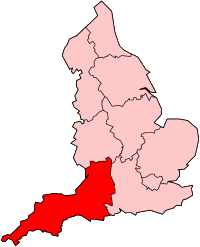United Downs Deep Geothermal Power
United Downs Deep Geothermal Power is a planned geothermal energy power plant in Redruth in Cornwall, England, UK. The UK Government has invested in the project through the Getting Building Fund.[1] It aims to begin live operation by 2022.
Sited on the United Downs industrial estate, the plant will generate 10 MW of electricity to be sold to the National Grid; and 55 MW of thermal energy, to be distributed locally. It is being developed by Geothermal Engineering Limited, a privately owned British company founded in 2008 specialising in the development of geothermal resources.
The Enhanced Geothermal System being employed to generate power at United Downs targets volumes of rock that already exhibit enhanced permeability. The plan for United Downs is to drill three boreholes to a true depth of 4.5 kilometres (2.8 mi). Water is pumped down a borehole which then travels through fractures in the rock, capturing the heat, until it is pumped out of one or more production boreholes as very hot pressurised water, which is then converted into electricity using a steam turbine.[4][5] The water for charging the reservoir will come from flooded mines, not from the local water supply. The hot water produced by the plant can also be used to supply thermal energy and air conditioning (via an absorption chiller) to the surrounding area.
History[]
Geothermal Engineering announced the plans for the United Downs geothermal power station in October 2009 and held a local consultation in Carharrack in the same month.[6] In December 2009 the company received £1.475 million in funding from the Department of Energy and Climate Change.[7]
On 13 August 2010 the United Downs plant was granted planning permission by Cornwall Council in a unanimous vote.[8][9] At that time, the drilling of the first well was expected to begin in early 2011 and the plant was expected to be operational by 2013-2014.[10][11]
In November 2011, Geothermal Engineering was awarded a grant of £6m from the European Regional Development Fund towards the cost of the project and drilling of the first well was expected to begin in late 2012.[12]
In April 2013, the grant was withdrawn due to the company's failure to attract private funding for the project.[13]
In 2017, United Downs looked at raise £4.4m of private funding via debentures offered by renewable energy debit crowdfunding specialists Abundance Investment.[14] It reached its target in the first week of August 2017, less than a fortnight after being listed. Abundance planned to then raise further funds by issuing more debentures of £95,000 or over, with the total raised to be a maximum of £5.27m.[15]
In January 2021 the company agreed to sell 3 Megawatt-hours a year for 10 years to Ecotricity.[16][17]
See also[]
Geothermal power in the United Kingdom
References[]
- ^ "LEP agrees £14M investment". Business Cornwall. Retrieved 17 July 2021.
- ^ Bertani, Ruggero (September 2007), "World Geothermal Generation in 2007" (PDF), Geo-Heat Centre Quarterly Bulletin, Klamath Falls, Oregon: Oregon Institute of Technology, 28 (3), pp. 8–19, retrieved 12 April 2009
- ^ Fridleifsson, Ingvar B.; Bertani, Ruggero; Huenges, Ernst; Lund, John W.; Ragnarsson, Arni; Rybach, Ladislaus (11 February 2008). O. Hohmeyer and T. Trittin (ed.). The possible role and contribution of geothermal energy to the mitigation of climate change (PDF). IPCC Scoping Meeting on Renewable Energy Sources. Luebeck, Germany. pp. 59–80. Archived from the original (PDF) on 8 March 2010. Retrieved 6 April 2009.
- ^ Halper, Mark (11 October 2009). "We're mining for heat in Cornwall". The Independent. London. Retrieved 30 January 2010.
- ^ "Geothermal power plant set to become a reality in Cornwall". New Civil Engineer. Emap Ltd. 19 October 2009. Retrieved 30 January 2010.
- ^ "'Hot rocks' power plant plans revealed". Western Morning News. 13 October 2009. Retrieved 15 August 2015.
- ^ "Geothermal power plant gets funds". BBC News. 21 December 2009. Retrieved 30 January 2010.
- ^ "'Hot rocks' geothermal energy plant promises a UK first for Cornwall". Western Morning News. 17 August 2010. Retrieved 15 August 2015.
- ^ "UK's first geothermal plant given go-ahead". Financial Times. 15 October 2010. Retrieved 17 August 2010.
- ^ "Drilling to begin for Cornwall geothermal power plant in 2011". The Guardian. 16 August 2010. Retrieved 17 August 2010.
- ^ "Geothermal projects get funding boost". The Ecologist. 22 December 2009. Retrieved 30 January 2010.
- ^ "£6 Million Grant For Geothermal Energy Project in Cornwall". Invest in Cornwall. 1 November 2011. Retrieved 2 September 2013.
- ^ "Geothermal project on rocks after funding blow". this is Cornwall. 4 April 2013. Retrieved 2 September 2013.
- ^ Vaughan, Adam (16 July 2017). "'Groundbreaking': Cornwall geothermal project seeks funds". The Guardian. Retrieved 1 August 2017.
- ^ Richter, Alexander. "UK geothermal project successfully raises $5.7 million in crowdfunding campaign". ThinkGeoEnergy. Retrieved 16 August 2017.
- ^ Src="https://Secure.gravatar.com/Avatar/85685f701ea8d0d268f1b71aaa641f10?s=50, <img Alt=""; amp;d=mm; Srcset="https://Secure.gravatar.com/Avatar/85685f701ea8d0d268f1b71aaa641f10?s=100, Amp;r=g"; amp;d=mm; Says, Amp;r=g 2x" Class="avatar Avatar-50 Photo" Height="50" Width="50" Loading="lazy"> Brianmilnes (4 January 2021). "Sold! The UK's first geothermal electricity to the grid |". Retrieved 7 January 2021.CS1 maint: multiple names: authors list (link)
- ^ "Ecotricity seals 10-year agreement to take geothermal power from Cornish plant". Energy Live News. 7 January 2021. Retrieved 15 March 2021.
External links[]
- Geothermal power stations in England
- Renewable energy companies of England
- Electric power companies of England
- Power stations in South West England
- British companies established in 2008
- Energy companies established in 2008
- Renewable resource companies established in 2008
- 2008 establishments in England
- Economy of Cornwall
- Redruth

